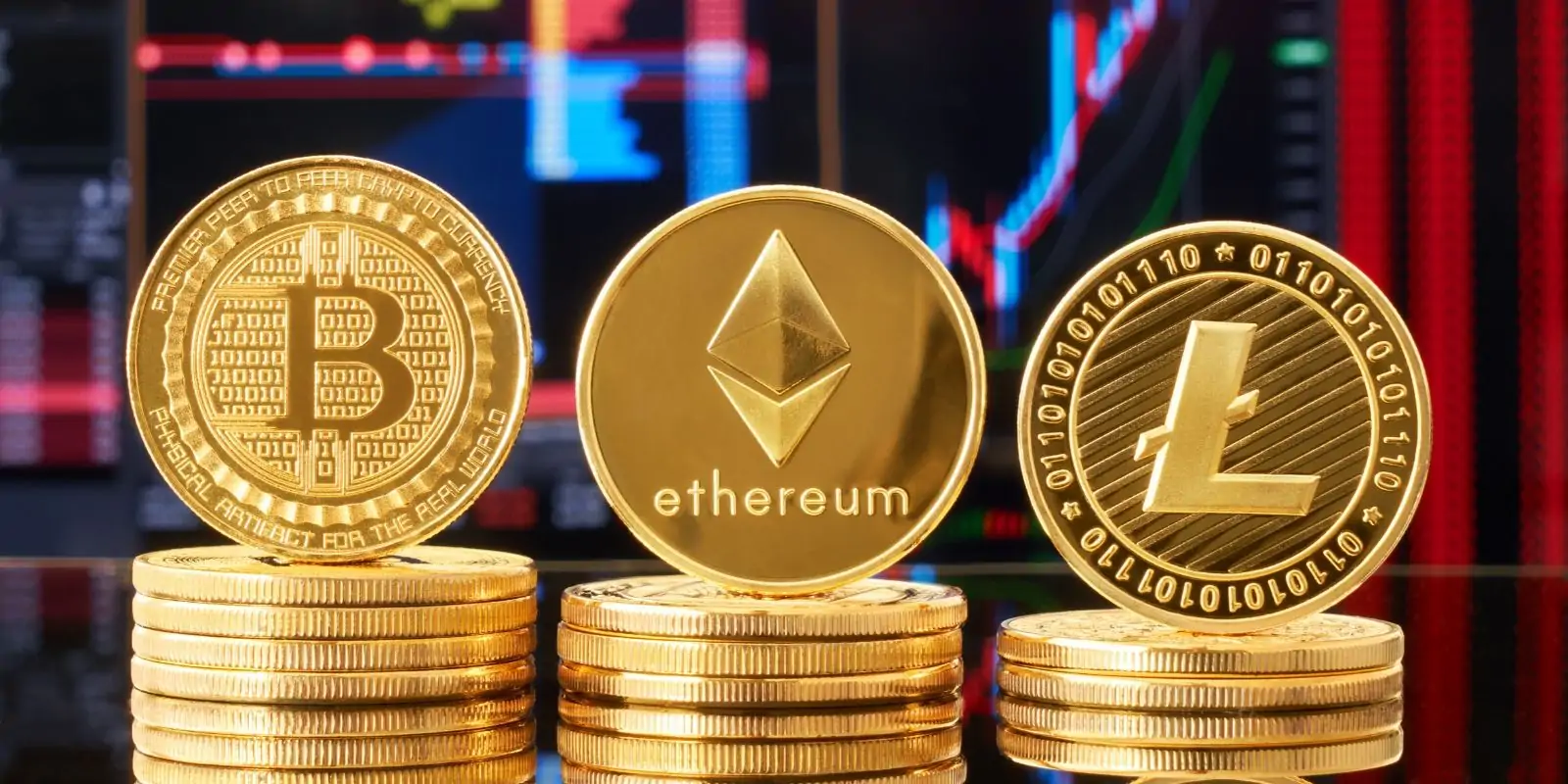From traditional banks to cryptocurrencies

The history of cryptocurrencies dates back to 2009. They burst onto the scene as an alternative to traditional banking and financial markets. However, many of today's banking and financial institutions rely on blockchain technology and cryptocurrencies to improve their system. In addition, many newly created cryptocurrencies are also trying to penetrate the traditional financial market.
In fact, it's no surprise that banking entities are shaking hands with cryptocurrencies. The future of traditional banking would be nil if it did not evolve and adapt to the advance of New Technologies.
Our financial system continues to be anchored in a model that was developed in the second half of the last century. It has endured the challenges of the passage of time with various technological patches, which have failed to really adapt effectively to the digital age.

Get 200% Bonus after your first deposit. Use this promo code: argent2035
The cryptocurrency revolution
The arrival of cryptocurrencies has been a disruptive process in the financial landscape, providing more benefits for the user. In this sense, customers do not need intermediaries to carry out their economic transactions.
Moreover, these processes are immediate, can be done from any mobile device and provide access to a global economy.
The financial system at the service of all
It should be taken into account that more than 2 million people worldwide do not have access to traditional banking services. The appearance of cryptocurrencies has come to alleviate this situation. This allowed them to participate in the global economy. It was a real revolution that includes the possibility of getting out of poverty.
This mode of operation favors the appearance of monetary networks which are established between equals. It is more and more frequent to witness this type of connection. The direct consequence for the financial industry translates into a real threat to the whole sector.
The reason for fear of banking: peer-to-peer operations with cryptocurrencies escape centralized control. In addition, transferring money internationally is more agile and cheaper.
The BBA UK Report “ Digital Disruption: UK Banking Report shows this very clearly. For experts, with the use of Bitcoin, people handle many requirements on their own that until now required a bank. Now interaction with a bank is unnecessary, and the user even saves on commissions.
Has traditional banking disappeared?
Digital currencies have shaken the foundations of a sector that lived rooted in the past. The evolution of traditional banking has not gone hand in hand with the needs generated by customers.
As the world plunged into the industrial revolution 4.0. Sectors and companies had to face a powerful change that would keep them in the market and absolutely competitive.
Banking entities have attempted to delay or even avoid an inevitable transformation process. Even the central banks have not been able to decide. In any case, even if they come late, they have no choice but to reinvent themselves and cryptocurrencies are only the tip of the iceberg against which they can come up against.
In fact, if they want to stay competitive, big banks need to go through a deep digitalization process. They must be ready to offer, in real time, the options and services that, as a user, are obtained by operating with cryptocurrencies.
It is true that the most notable banks in the sector have begun to invest in order to research and develop the blockchain technology. The intention is to be able to regain ground and gain a foothold in the field of digital banking.
Farewell to malpractice
Beyond the technological renewal, the traditional bank must get rid of the halo of mistrust that surrounds it in the eyes of the consumer. For decades, banks have been in the crosshairs of disgruntled users who, not without a healthy dose of helplessness, witness unethical actions.
Manipulation of accounts, application of debits before credits, collection of commissions, abusive clauses, obligation to buy financial products… and a long etcetera, ended up instilling in the customer a feeling of general mistrust.
From now on, this sector must learn that with digitization, customers have access to all their trips via a simple smartphone. It is clear that these banking practices have their days numbered.
To deal with this situation, there are already banks trying to improve their image. To do this, they have focused on, among other things, improving their customer service, offering digital options and reducing or even eliminating commissions.
In any case, in the opinion of banking experts, the traditional bank must bet on digital solutions that go beyond its entrenched barriers. This means that they must go beyond simply applying, in a standardized way, certain options such as mobile banking services.
In the midst of the disruptive process the financial system finds itself in, if they do not abandon past practices and embrace the profound transformation they need, they risk being left behind.
Specialized publications such as American Banker encourage banks to declare that cryptocurrencies can also be an opportunity for banks. The magazine points out that questions such as how to process payments, facilitate international cash transactions, allow the exchange of bitcoins for current currency or dare to give loans in virtual currency, could boost the sector.
Traditional banking vs cryptocurrencies, evolution of financial markets
In recent times, there has been a certain transformation in the behavior patterns of some traditional banks and financial institutions. They seem to have wanted to carve out a place for themselves in the field of cryptocurrencies and blockchain.
They say they want to implement improvements in the banking network. The truth is that new cryptocurrencies have been created which, hand in hand with the bank, are trying to enter the traditional banking market.
One of the most recent cases refers to the association that has been established between Santander and 13 other banks, including names as powerful as Barclays, Credit Suisse, ING, Lloyds Banking Group, Nasdaq or Commerzbank.
These pillars of traditional banking created Fnality. The intention involves the establishment of a “ network of decentralized financial market infrastructures ". It has its own digital currency, USC. This cryptocurrency has been tied, in terms of value, to fiat currencies.
There is no option. The battle between traditional banking and cryptocurrencies has begun and if the former want to compete with cryptocurrencies. Traditional banks have to change a lot of things. The process must go through, among other things, the elimination of risks, costs and inefficiencies. Will they be able or is it the end of an old system without answers for a globalized financial environment?
In fact, it's no surprise that banking entities are shaking hands with cryptocurrencies. The future of traditional banking would be nil if it did not evolve and adapt to the advance of New Technologies.
Our financial system continues to be anchored in a model that was developed in the second half of the last century. It has endured the challenges of the passage of time with various technological patches, which have failed to really adapt effectively to the digital age.

Get 200% Bonus after your first deposit. Use this official Promo code: argent2035
The cryptocurrency revolution
The arrival of cryptocurrencies has been a disruptive process in the financial landscape, providing more benefits for the user. In this sense, customers do not need intermediaries to carry out their economic transactions. Moreover, these processes are immediate, can be done from any mobile device and provide access to a global economy.
The financial system at the service of all
It should be taken into account that more than 2 million people worldwide do not have access to traditional banking services. The appearance of cryptocurrencies has come to alleviate this situation. This allowed them to participate in the global economy. It was a real revolution that includes the possibility of getting out of poverty.
This mode of operation favors the appearance of monetary networks which are established between equals. It is more and more frequent to witness this type of connection. The direct consequence for the financial industry translates into a real threat to the whole sector.
The reason for fear of banking: peer-to-peer operations with cryptocurrencies escape centralized control. In addition, transferring money internationally is more agile and cheaper.
The BBA UK Report “ Digital Disruption: UK Banking Report shows this very clearly. For experts, with the use of Bitcoin, people handle many requirements on their own that until now required a bank. Now interaction with a bank is unnecessary, and the user even saves on commissions.
Has traditional banking disappeared?
Digital currencies have shaken the foundations of a sector that lived rooted in the past. The evolution of traditional banking has not gone hand in hand with the needs generated by customers.
As the world plunged into the industrial revolution 4.0. Sectors and companies had to face a powerful change that would keep them in the market and absolutely competitive.
Banking entities have attempted to delay or even avoid an inevitable transformation process. Even the central banks have not been able to decide. In any case, even if they come late, they have no choice but to reinvent themselves and cryptocurrencies are only the tip of the iceberg against which they can come up against.
In fact, if they want to stay competitive, big banks need to go through a deep digitalization process. They must be ready to offer, in real time, the options and services that, as a user, are obtained by operating with cryptocurrencies.
It is true that the most notable banks in the sector have begun to invest in order to research and develop the blockchain technology. The intention is to be able to regain ground and gain a foothold in the field of digital banking.
Farewell to malpractice
Beyond the technological renewal, the traditional bank must get rid of the halo of mistrust that surrounds it in the eyes of the consumer. For decades, banks have been in the crosshairs of disgruntled users who, not without a healthy dose of helplessness, witness unethical actions.
Manipulation of accounts, application of debits before credits, collection of commissions, abusive clauses, obligation to buy financial products… and a long etcetera, ended up instilling in the customer a feeling of general mistrust.
From now on, this sector must learn that with digitization, customers have access to all their trips via a simple smartphone. It is clear that these banking practices have their days numbered.
To deal with this situation, there are already banks trying to improve their image. To do this, they have focused on, among other things, improving their customer service, offering digital options and reducing or even eliminating commissions.
In any case, in the opinion of banking experts, the traditional bank must bet on digital solutions that go beyond its entrenched barriers. This means that they must go beyond simply applying, in a standardized way, certain options such as mobile banking services.
In the midst of the disruptive process the financial system finds itself in, if they do not abandon past practices and embrace the profound transformation they need, they risk being left behind.
Specialized publications such as American Banker encourage banks to declare that cryptocurrencies can also be an opportunity for banks. The magazine points out that questions such as how to process payments, facilitate international cash transactions, allow the exchange of bitcoins for current currency or dare to give loans in virtual currency, could boost the sector.
Traditional banking vs cryptocurrencies, evolution of financial markets
In recent times, there has been a certain transformation in the behavior patterns of some traditional banks and financial institutions. They seem to have wanted to carve out a place for themselves in the field of cryptocurrencies and blockchain.
They say they want to implement improvements in the banking network. The truth is that new cryptocurrencies have been created which, hand in hand with the bank, are trying to enter the traditional banking market.
One of the most recent cases refers to the association that has been established between Santander and 13 other banks, including names as powerful as Barclays, Credit Suisse, ING, Lloyds Banking Group, Nasdaq or Commerzbank.
These pillars of traditional banking created Fnality. The intention involves the establishment of a “network of decentralized financial market infrastructures”. It has its own digital currency, USC. This cryptocurrency has been linked, in terms of value, to fiat currencies.
There is no option. The battle between traditional banking and cryptocurrencies has begun and if the former want to compete with cryptocurrencies. Traditional banks have to change a lot of things. The process must go through, among other things, the elimination of risks, costs and inefficiencies. Will they be able or is it the end of an old system without answers for a globalized financial environment?



















Leave comments